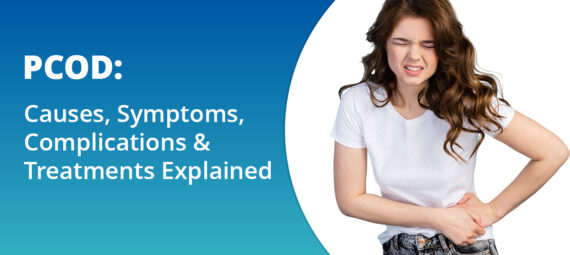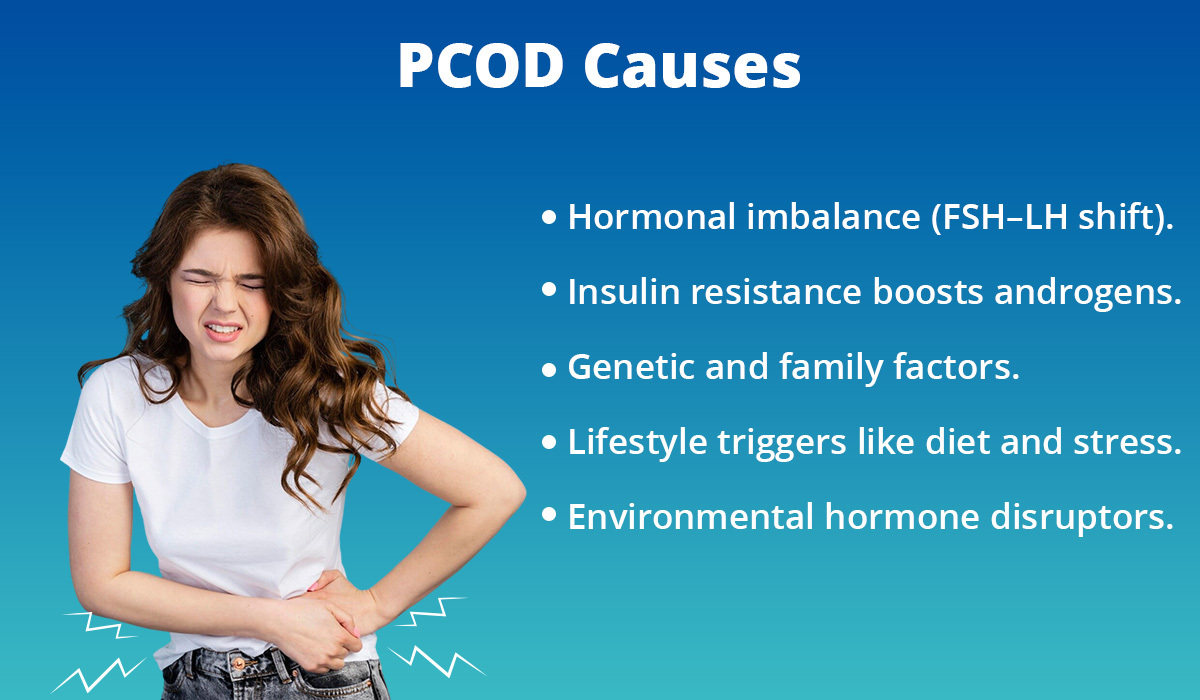PCOD is a common hormonal condition that affects how the ovaries work, how often a woman ovulates and how regular her periods are. When the ovaries release many immature follicles, they disrupt the natural rhythm of the menstrual cycle and change how the body handles insulin and androgens. Many women first notice irregular periods, acne, excess hair growth, weight gain or mood swings before they hear the term PCOD.
Women need clear information about PCOD Causes, PCOD Symptoms, PCOD Differences from PCOS, possible PCOD Complications and practical PCOD treatments. At Homeocare International, our doctors focus on long term hormonal balance and reproductive health with personalised homeopathy treatment for PCOD. Women across Chennai, Hyderabad and Bangalore consult our chain of homeopathy clinics for safe and consistent care.
This guide explains PCOD in simple, complete steps so every reader understands what is happening inside the body.
What Is PCOD?
PCOD stands for polycystic ovarian disease. In PCOD, the ovaries produce multiple small follicles that do not mature or release eggs regularly. These follicles appear as small cyst-like structures on pelvic ultrasound but are actually immature eggs stuck in early development.
When ovulation becomes irregular, hormone levels shift. This hormonal imbalance affects the menstrual cycle, skin, hair, weight, mood and fertility over time.
PCOD Causes
PCOD usually develops due to a combination of hormonal, metabolic, genetic and lifestyle factors.
1. Hormonal Imbalance
In PCOD, the balance between follicle-stimulating hormone (FSH) and luteinizing hormone (LH) changes. This prevents follicles from maturing properly and increases production of male hormones such as testosterone. This hormonal dysfunction triggers irregular ovulation, acne, excess hair growth and menstrual irregularities.
2. Insulin Resistance
Many women with PCOD have insulin resistance. The body produces more insulin to keep blood sugar within range. High insulin levels stimulate the ovaries to produce more androgens. This cycle worsens weight gain, belly fat, ovulatory dysfunction and increases the risk of metabolic syndrome and diabetes.
3. Genetic And Family Factors
PCOD often runs in families. If a mother, sister or close relative has PCOD, PCOS or related endocrine disorders, the risk increases. Genetic factors influence how the ovaries respond to hormones and how the body manages insulin and androgens.
4. Lifestyle Triggers
Unhealthy diet, frequent intake of refined carbohydrates, lack of exercise, chronic stress, poor sleep and rapid weight gain put pressure on the hormonal system. These lifestyle factors intensify PCOD Symptoms and increase long term health risks.
5. Environmental Factors
Continuous exposure to endocrine disrupting chemicals in plastics, packaged foods, cosmetics or pollutants may interfere with hormone regulation. These environmental factors do not act alone but can add to existing hormonal and metabolic stress.
PCOD Symptoms
PCOD Symptoms can affect the menstrual cycle, skin, hair, weight, mood and fertility. Homeocare International doctors look for these patterns during consultation.
1. Irregular Periods
Many women with PCOD experience:
- Irregular periods.
- Missed periods.
- Delayed periods.
- Very heavy or very light periods.
These changes occur because ovulation is irregular or does not happen regularly.
2. Skin And Hair Changes
Higher androgen levels cause visible skin and hair changes, such as:
- Persistent acne on the face, chest or back.
- Excess hair growth on the chin, upper lip, chest or abdomen (hirsutism).
- Hair thinning or male pattern baldness on the scalp.
These signs point toward androgen excess and hormonal imbalance.
3. Weight Gain And Fatigue
PCOD often leads to weight gain, especially around the abdomen. Many women find it difficult to lose weight. Most also report persistent fatigue and low stamina because insulin resistance and hormonal dysregulation affect energy use.
4. Mood And Emotional Changes
Hormone shifts influence neurotransmitters that control mood. Women with PCOD frequently report mood swings, anxiety and periods of low mood or depression. These mental health changes form part of PCOD, not a separate problem.
5. Dark Patches And Skin Tags
Insulin resistance can cause:
- Dark patches on the neck, underarms or groin (acanthosis nigricans).
- Small skin tags in body folds.
These are external signs that point toward long standing insulin-related issues.
Difference Between PCOD and PCOS
Many women search for PCOD Differences to understand where they stand.
- Scope: PCOD mainly affects the ovaries and menstrual cycle. PCOS represents a broader endocrine disorder that also affects metabolism, weight and cardiovascular risk.
- Ovulation: In PCOD, ovulation is irregular but still occurs in some cycles. In PCOS, anovulation is more common, and periods may stop for long durations.
- Androgen Levels: PCOS usually shows more severe androgen excess with stronger symptoms like hirsutism, severe acne and marked hair loss.
- Long Term Risks: Both conditions need proper care, but PCOS carries a higher risk of diabetes, metabolic syndrome and cardiovascular disease.
Understanding these differences helps doctors to customise the treatment plan.
PCOD Complications
If women ignore PCOD Symptoms and skip treatment, several long term PCOD Complications may develop.
1. Fertility Problems
Irregular ovulation reduces chances of conception. With planned treatment and proper ovulation support, many women with PCOD still conceive successfully. However, untreated ovulatory dysfunction can delay or prevent pregnancy.
2. Diabetes And Metabolic Syndrome
Insulin resistance increases the risk of developing type 2 diabetes and metabolic syndrome, which includes central obesity, high blood pressure, abnormal cholesterol and increased cardiovascular risk.
3. Heart And Blood Vessel Problems
Long term hormonal imbalance and metabolic changes raise cholesterol and blood pressure. Over time, this can increase the risk of heart disease and other cardiovascular issues.
4. Endometrial Cancer Risk
When periods are infrequent or absent, the uterine lining may not shed regularly. Prolonged exposure of the lining to unopposed estrogen may increase the risk of endometrial cancer. Regular cycle monitoring and treatment help reduce this risk.
5. Sleep And Mental Health Issues
Weight gain and hormonal shifts can lead to obstructive sleep apnea, poor sleep quality, anxiety and depression. These issues affect daily life and need proper attention along with physical symptoms.
How Doctors Diagnose PCOD?
Homeocare International doctors use a structured approach to diagnose PCOD correctly.
1. Symptom And History Assessment
Doctors take a detailed history of:
- Menstrual cycle pattern.
- Skin and hair changes.
- Weight gain and energy levels.
- Mood changes and stress.
- Family history of PCOD, PCOS or diabetes.
This helps identify likely PCOD Symptoms and risk factors.
2. Blood Tests
Doctors may recommend blood tests to measure:
- FSH and LH balance.
- Estrogen and progesterone levels.
- Prolactin.
- Testosterone and other androgens.
- Fasting sugar, insulin and lipid profile.
These values reveal hormonal imbalance, androgen excess, insulin resistance and metabolic risk.
3. Pelvic Ultrasound
A pelvic ultrasound assesses:
- Ovary size.
- Number and pattern of follicles.
- Presence of polycystic ovary morphology.
Diagnosis combines symptoms, blood test results and ultrasound findings.
PCOD Treatments
Effective PCOD treatments correct the underlying hormonal disturbance, not just the symptoms.
1. Lifestyle Modification
Doctors at Homeocare International always include lifestyle modification as a core part of PCOD management. This includes:
- Balanced diet with controlled refined carbohydrates and sugars.
- Regular exercise such as brisk walking, strength training or yoga.
- Weight management to reduce androgen levels and insulin resistance.
- Consistent sleep schedule and stress management techniques.
These steps improve insulin sensitivity and support hormonal balance.
2. Conventional Medical Support
Alongside lifestyle changes, gynaecologists or endocrinologists may prescribe:
- Metformin to improve insulin resistance.
- Birth control pills to regulate the menstrual cycle.
- Ovulation induction medicines when a woman plans pregnancy.
These options require regular follow up and monitoring.
3. Homeopathy For Long Term Hormonal Balance
Many women also look for long term, gentle support that works on the root cause. This is where homeopathy plays an important role in PCOD treatments.
Homeopathy Treatment For PCOD At Homeocare International
Homeocare International, a leading chain of world-class homeopathy clinics, offers constitutional homeopathy treatment for PCOD. Our approach focuses on treating the root cause of PCOD rather than the symptoms and helps in restoring hormonal balance, improving ovulation and preventing long term complications.
How Homeopathy Helps PCOD?
Homeopathy at Homeocare International aims to:
- Regularise the menstrual cycle and reduce irregular periods.
- Improve ovulation and reduce anovulation episodes.
- Balance androgen levels and reduce acne, excess hair and hair thinning.
- Support insulin regulation and weight management.
- Ease mood swings, fatigue, anxiety and stress related to PCOD.
Doctors select remedies after detailed case analysis, not by using a single fixed medicine for all patients.
Based on this, the team offers individualised homeopathy treatment for PCOD in Chennai, homeopathy treatment for PCOD in Hyderabad and homeopathy treatment for PCOD in Bangalore. Regular follow up and health monitoring help track progress and refine the treatment plan.
When Should You Seek PCOD Treatment?
Women should consult a specialist if they notice:
- Irregular, missed or delayed periods for several cycles.
- Difficulty conceiving after regular attempts.
- Rapid or stubborn weight gain, especially around the abdomen.
- Increasing acne or excess facial and body hair.
- Dark patches on the neck, underarms or groin.
- Persistent fatigue, mood swings or low mood.
Early medical consultation and structured treatment at Homeocare International help control PCOD Causes, reduce PCOD Complications and protect long term reproductive and metabolic health.
Schedule your appointment for PCOD with our expert homeopathic doctors at 1800-102-2202 now.
FAQs
What causes PCOD and why does it happen?
PCOD occurs due to a mix of hormonal imbalance, androgen excess, insulin resistance, genetic factors and lifestyle triggers. These factors disrupt ovulation, produce multiple immature follicles and create polycystic ovary changes.
What PCOD Symptoms should women look out for?
Women should watch for irregular periods, missed cycles, acne, excess hair, hair thinning, weight gain, dark neck patches, fatigue and mood swings. These PCOD Symptoms often appear together and signal the need for evaluation.
How is PCOD different from PCOS in practical terms?
PCOD mainly affects ovarian function and menstrual cycles. PCOS also affects metabolism, weight, insulin, cholesterol and cardiovascular risk. These PCOD Differences help doctors decide the intensity of treatment and monitoring.
What long term PCOD Complications can develop if women ignore treatment?
Untreated PCOD can lead to fertility problems, diabetes, metabolic syndrome, heart disease, endometrial cancer risk, sleep issues and persistent anxiety or depression.
What PCOD treatments work best in real life?
Effective PCOD treatments usually combine lifestyle correction, conventional medical support where required and long term hormonal balancing methods such as homeopathy. This combined approach helps control symptoms and reduce complications.
How does Homeocare International support women with PCOD?
Homeocare International offers personalised homeopathy treatment for PCOD in Chennai, Hyderabad and Bangalore. Our doctors create tailored treatment plans that focus on hormonal balance, ovulation improvement, insulin regulation and overall reproductive and emotional health, backed by regular follow up and education.


